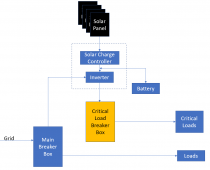Hmmmm..... I am not sure there is a single place to point you. Lets look at a diagram
View attachment 70124
Most battery backup systems are not large enough to power the whole house. Consequently, it is desirable to have the 'critical loads' on a separate breaker box that the battery system can drive while the non-critical loads remain off.
Critical loads might include
Refrigerators/freezers
Selected lights
Selected outlets for computers & communication gear
Selected kitchen appliances.
The non critical loads are typically high amp things that you could live without during a blackout. These might include things like an electric oven or an Air Conditioner.
A recent innovation that you might consider are the new 'smart panels' (
Span is one example). These allow a single breaker panel, but they are loaded with electronics that allow you to select what circuits are powered during a power outage and which ones are not. These also typically provide a ton of information about power usage down to the circuit level of granularity. These are new enough on the market that I still have a lot of questions about the long term reliability and cost. However, if the main panel is being replaced anyway, the cost might not be as bad.
Note: I am not saying they don't have good reliability... it is just that they are new enough that there is no track record. If I were to install one of these, I would want to understand the warranty and understand what it takes to repair one if there is a failure.



